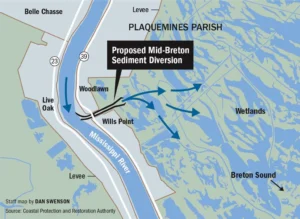(Oct. 12. Published version at this link. Slightly different version here.]
Gov. Jeff Landry’s administration seems far more eager to cancel wetlands restoration projects than to say what should be done instead.
For the second time this year, the administration on Thursday canceled a Mississippi River diversion program, this time the Mid-Breton Sediment Diversion on the river’s east bank, across from Delacroix. In July, the state canceled the Mid-Barataria Sediment Diversion on the west bank of the river near Myrtle Grove.
The state already had spent some $619 million on Mid-Barataria and some $70 million on Mid-Breton. The former was slated to cost a total of $3 billion, while Gordon Dove, chairman of the state’s Coastal Protection and Restoration Authority, said the latter’s cost had grown from an estimated $800 million to $1.8 billion.
Both projects had attracted spirited opposition from seafood-industry interests, while Mid-Barataria also found enemies among those worried about hundreds of dolphins the freshwater diversion was projected to kill.
Before the Mid-Barataria project was nixed, I had written twice that it was a well-meaning but ill-advised endeavor. As a decadeslong advocate for coastal wetland restoration, though, I thought it crucial to identify numerous other options for marsh replenishment to replace the massive Mississippi River diversion. Among the many options were (and are) smaller diversion projects, backfilling of oil pipeline canals, use of dredged material from the Mississippi River and elsewhere, and major efforts to seed new oyster reefs.
So far, at least, that concern about alternate strategies for coastal salvation seems stunningly unemphasized by Landry and Dove. And even where Dove has made noises in that direction, specificity has been notably lacking. Almost all the administration’s verbiage has been about how the two diversion projects had become too expensive — but not about how expensive, in manifold other ways, it will be to keep letting the wetlands erode at a furious pace.
More than seven weeks have passed since the cancellation of Mid-Barataria was announced, and that decision had been in the works for months before that. Those seven weeks alone, not to mention the long run-up to the decision, should have been plenty long enough for officials to have indicated progress toward alternative arrangements.
Likewise, Dove said publicly as early as May that the cancellation of Mid-Breton was likely. Why weren’t officials ready, the very day they announced the project’s death, to say what else they hope to do to preserve the state’s coastal heritage? Or, for that matter, how the finances will work out, with tens of millions of dollars apparently down the drain and with hundreds of millions potentially available — but also potentially forfeitable if the federal government tries to claw the funds back.
Dove did say the state would seek to reprogram the money slated for Mid-Breton for a range of projects, including the use of dredged sediment in the Barataria Basin. Good. But what else? Where are the details? What are the metrics for success? How will he guarantee accountability?
I have no idea if the abandonment of the Mid-Breton project was the right call. Perhaps it was. But it is foolhardy to say, as Dove did, that much smaller-scale, existing projects mean “you don’t have any need for” sediment flow of the sort Mid-Breton was intended to produce. The existing projects are creating a pittance of the marsh restoration needed to counteract the 20 square miles, at the very least, that the state is losing each year. Louisiana’s citizens deserve plans much more comprehensive than the administration is offering.

If no announcements of far more substance are soon forthcoming, the silence will be a major example of governmental malpractice. Too much work, for decades, has gone into attracting too much money, to help combat too big a need, for it all to be frittered away.
The administration should be giving a sense of urgency here, not of torpor. Of specificity, not vagueness. And of transparency, not obfuscation.
Unless something changes soon, the administration’s reputation for good stewardship of Louisiana land and finances will disappear even faster than the wetlands.





